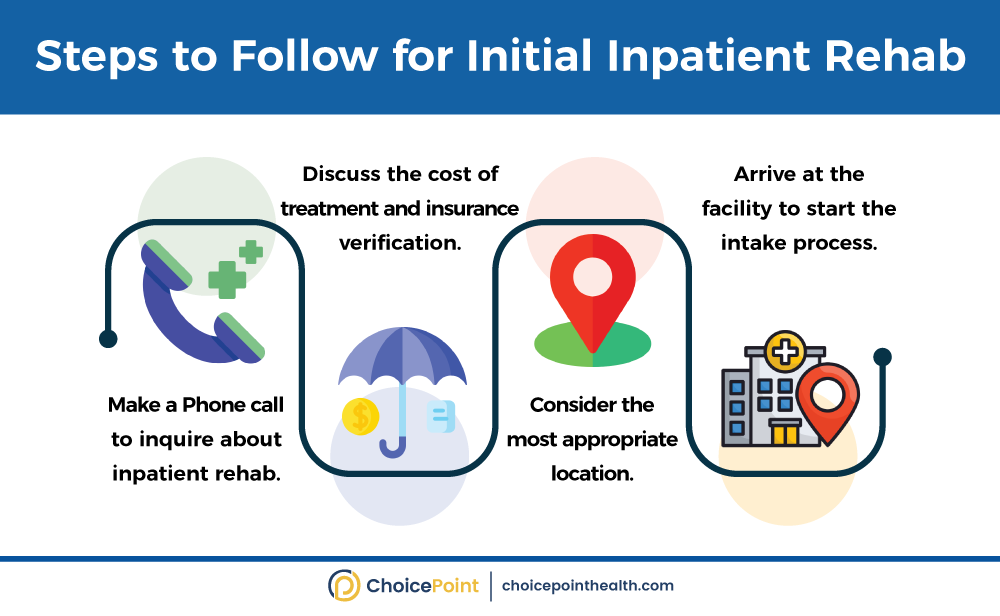According to studies, 10% of adults in the U.S. were involved in substance use disorder (SUD). Substance use can be challenging for anyone dealing with an addiction, so planning for official intervention through inpatient rehab is necessary for you and your loved ones.
ChoicePoints is an addiction treatment center that can guide your inpatient rehab queries through their DEA-Certified experts. Call Now 844.445.2565 to get support for you and your dear ones in addiction treatment.
Table of Contents
What is Inpatient Rehab?
An addiction treatment process in which a person stays 24/7 under the medical supervision of doctors to get potentially treated for their addiction problems. Some of the benefits and concerns that are observed during the treatment process include:
- Medical and social detox
- Withdrawal symptom management
- Psychotherapy treatment for the well-being of mental health.
- Staying away from triggering environments often isolated in a room or with peer groups.
- Learning about addiction, self-care, and social skills
A. Preparing for Admission
If a person has finally decided to get admitted to Inpatient Rehab. There are several things they need to take care of first before checking in, like:
- Prepare mentally and quit any substance or alcohol use.
- Inform family, friends, and employers about the expected stay.
- Fulfill family, work, and financial obligations like household chores, pending work, and bills to be paid before entering inpatient rehab.
- Meet and greet with loved ones so that self-confidence and a sense of responsibility could be developed before going in for rehab.
- Relax to avoid nervousness.
B. Items to Collect Before Inpatient Rehab
Before getting admitted to Inpatient Rehab, individuals must pack certain essential and personal items to take with them to avoid any inconvenience during their stay.
- Grooming items, clothes to wear, and towels.
- Tooth brush, Shaving kit, Shampoo, and soap
- Prescription medications for underlying conditions such as blood pressure, Diabetes, etc.
- All the personal documents, including essential contact details, government ID, and Insurance documents.
- Recreational and motivational books to read and divert the mind in isolation.
C. Admission Criteria
After assessment of the patient through ASAM criteria of addiction admission, if the individual falls into inpatient rehab (level 3), they are evaluated through DSM-5 to look for mental health status before admission. Some essential pre-admission screening includes:
- Blood tests and medical history to check the levels of substance used and underlying medical conditions
- Verifying Insurance and payment options to keep a smooth treatment tenure without financial or legal hurdles.
- Patient assessment for a treatment plan, duration of stay, and travel arrangements if the rehab center is far away from home.
- Planning for potential addiction therapies needed for the patient’s long-term recovery.
Planning to get admitted today or looking for how to get insurance to pay for inpatient rehab? Call Now 844.445.2565 to have an expert opinion!
D. First Day at an Inpatient Rehab
After traveling to a rehab center and 1-2 hours of initial screening and admission, individuals start with the treatment. Here is what they may expect:
- Introductions and interviews with the rehab community, including staff and fellows.
- A thorough inspection of their belongings just to avoid any mishap during treatment.
- A guided tour of the center, including its facilities, meals, and available activities.
- Schedule making for the treatment and familiarizing with the general plan of rehab.
- Making them comfortable with the ongoing environment of rehab and controlling nervousness about the treatment and surroundings.
Curious to learn about your days at the rehab center? This article can help you give better insight. Read now the pros and cons of inpatient rehab Near me.

The Rehab Intake Process
What to Expect While Admitted to Inpatient Rehab
When it starts, the staff makes a person comfortable with the center’s environment and guides them with upcoming treatment plans.
Some major procedures to remember while being admitted to an inpatient rehab comprise two steps.
1. Medical Detox
Individuals start their inpatient rehab with medication-assisted treatment in which doctors prescribe FDA-approved medications, i.e., Suboxone, Subutex, Naltrexone, Buprenorphine, etc., to clear any substance intoxication within the body.
They also manage withdrawal symptoms with 24/7 staff surveillance to help recover effectively and stay on track.
2. Counseling with Psychotherapies
After successful detoxification, patients are derived through psychosocial therapies to restore their mental health and develop self-esteem and self-care strategies. Some of the major therapies include
3. Relapse Prevention and Aftercare
Once a person has cleared detox and therapy sessions, the staff will provide a comprehensive plan to prevent relapse in daily life. Diet plans, therapies, co-curricular activities, stress management, and improved thinking strategies are taught for aftercare.
Items to Avoid for Inpatient Rehab
Take extra precautions while committing to the rehab journey, and don’t bring any:
-
- Alcoholic beverages and illicit drugs
- Items that contain toxic or alcoholic substances, such as mouthwash, perfumes, nail polish, etc.
- Electronic gadgets such as DVDs, musical instruments, games, mobile phones, and laptops to avoid distraction.
- Unapproved or expired OTC medications
- Pornography, weapons, and any harmful items such as metal bracelets, knives, nail cutters, etc
- Flammable items
Are you preparing to get admission to inpatient rehab? Call Now 844.445.2565 to get an expert guide!

Why You Need to Get Admit to Rehab
How to Get Someone to Inpatient Rehab
Few things to keep in mind before approaching someone with an addiction problem.
- Assess their condition, understand the signs of misuse, and whether they struggle to control or have any social impairment.
- Discover Inpatient rehab centers near you with appropriate facilities.
- Educate them on the situation’s potential harms, effects, and severity.
- Take a professional’s advice and intervene to help them revive.
- Communicate positively, never force or rebuke, and guide them with love!
- Never wait for the worse. Seek immediate help before it’s too late!
Ready to get admitted to Inpatient Rehab
Struggling to find the perfect inpatient rehab guide online? ChoicePoint’s 24/7 telehealth service can assist you in your addiction treatment hunt! Call Now 844.445.2565 to get DAE-Certified specialists’ online inpatient guidelines on how to start your inpatient rehab.
Medical Disclaimer:
ChoicePoint aims to improve the quality of life for people struggling with substance use disorder and mental health issues. Our team of licensed medical professionals research, edit and review the content before publishing. However, this information is not intended to be a substitute for professional medical advice, diagnosis, or treatment. For medical advice please consult your physicians or ChoicePoint's qualified staff.










Review Guide On How to Get Admitted to Inpatient Rehab.